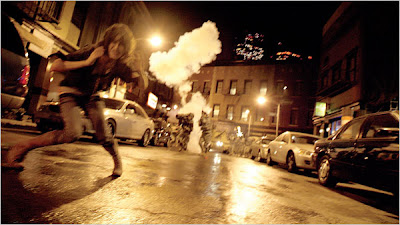
The Jason Bourne Trilogy (2002-7)
He's not a ladies man. He doesn't have an arsenal of witty one-liners at his disposal. James Bond he is not, but that's not what we want from our super-spies these days (and it's no accident that when Daniel Craig took over as Bond he felt more like Bourne than Sean Connery). The editing in these films kicks as much ass as the action sequences.

Borat: Cultural Learnings of America for Make Benefit Glorious Nation of Kazakhstan (2006)
Here's a question: is the misogynistic, homophobic, antisemitic Borat Sagdiyev merely a stranger in a strange land or is he the personification of how the rest of the world views the "ugly American" let loose in the "US and A"?

Twilight (2008)
Don't laugh: "Twilight" is actually a very well made movie that does something most films should try to do more of: isolate and examine a single human emotion, in this case teenage angst, and then layer every aspect of the project with details that accentuate the primary theme.

300 (2006)
During a decade where the "Clash of Civilizations" between Islam and the West dominated the news, it should be no surprise that one of the most ancient stories about this conflict should be re-told in contemporary way.

Saved! (2004)
In truth this is kind of a compromise picture. There can be little denying the enormous influence evangelicalism had on the decade and "Saved!" highlighted the best and worst aspects of that time in power.

The Saw Franchise (2004-present)
I have to admit to never having sat through more than just a few scenes of any of the now 6 Saw films, but it's hard to deny to the franchise that invented the incredibly lucrative "torture porn" genre does not have a place at the table during the now decade long discussion Americans have had over Guantanamo Bay.

An Inconvenient Truth (2006)
From a strictly filmic standpoint, this movie has "why bother?" written all over it: a lecture (boring) about science (double boring) given by Al Gore, a man who spent the better part of the last two decades being mocked as the most boring man alive. Yet Gore's clinical delivery only adds authority to the film's central disaster movie narrative.
There are also long term promotional effects of the film to consider. Right now, anyone running for President has to "write a book," but somewhere down the line they will also have to "make a movie," something most candidates have been reticent to do since Triumph of the Will . The formula is remarkably simple: find a problem, demonstrate a command of it's complexities, offer solutions and then run the candidate's personal story parallel to the policy narrative. Get used to seeing more pictures like it.

Harold & Kumar Go to White Castle (2004)
If the only movie you saw on race relations in America was Paul Haggis' "Crash" you might be under the impression that we're a nation of bigots incapable of living in the melting pot. The truth isn't nearly that bad, but much more complicated. H&K does nothing better than playing with the absurdity of stereotypes during a time of exploding diversity.

Cloverfield (2008)
I'm kind of surprised there weren't more brazenly 9/11 movies like Cloverfield and Spielberg's remake of War of the Worlds: a mysterious, unexplained monster suddenly starts "terrorizing" New York City and a gang of yuppie/hipster hybrids taken with the decade's obsession of capturing every moment of their lives on some kind of digital device struggle to stay alive.

Avatar (2009)
Nope, we haven't seen it yet, but we're going to take the leap of faith on this one based the premise and Cameron's track record. Yes, it's Dances with Smurfs, but in another respect it's a metaphor for an activity people engage in everyday: how many online avatars do you operate? We increasingly live in two worlds -- one virtual, the other real. Cameron is obviously tapping into this phenomenon with his storyline, which also parallels the immersion effect that his new technology will apparently have on the audience.




No comments:
Post a Comment